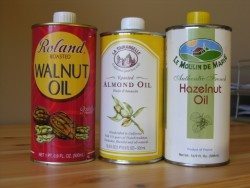Sometimes it can be confusing when you are trying to select what fats and oils to use in your cooking. Most people want to try and be healthy, but do not want to compromise the taste and flavour of the food they are preparing.
When it comes to selecting an oil to cook in, it’s not just a matter of choosing oils that are healthy, but also whether they stay healthy after having been cooked with. In other words, whether the oils and fats remain stable after heating When you’re cooking at a high heat, you want to use oils that are stable and don’t oxidize or go rancid easily. When oils oxide, they react with oxygen to form compounds that you definitely don’t want to be consuming with your food.
When you’re cooking at a high heat, you want to use oils that are stable and don’t oxidize or go rancid easily. When oils oxide, they react with oxygen to form compounds that you definitely don’t want to be consuming with your food.
The most important factor in determining an oil’s resistance to oxidation and rancidification, both at high and low heat, is the relative degree of saturated fat in the oil.
Saturated fats (and monounsaturated fats) are pretty resistant to heating, but oils that are high in polyunsaturated fats should be avoided for cooking. This is often the opposite of what we have been led to believe when discussing which fats to consume, however we are not discussing about ‘eating’ the oils and fats in this article, just cooking in them.
Let’s take a look at the pros and cons of some of the common oils and fats used for cooking in both homes and restaurants today.  Coconut oil is a very good choice for cooking. It is almost completely made of saturated fats, which makes it very resistant to heat. This oil is also very long lasting and can last for months and years in the cupboard without going rancid.
Coconut oil is a very good choice for cooking. It is almost completely made of saturated fats, which makes it very resistant to heat. This oil is also very long lasting and can last for months and years in the cupboard without going rancid.
Coconut oil also has powerful health benefits. It is particularly rich in a fatty acid called Lauric Acid, which can improve cholesterol and help kill bacteria and other nasty’s in the body.
When choosing a coconut oil to cook in, we recommend a virgin coconut oil, as it is usually the most ‘pure’ form of the oil you can purchase. Butter has always had a bad reputation due to its saturated fat content. However real butter is good for you and has been shown to be quite nutritious.
Butter has always had a bad reputation due to its saturated fat content. However real butter is good for you and has been shown to be quite nutritious.
It contains several important vitamins and minerals. It is also rich in the fatty acids Conjugated Linoleic Acid (CLA) and Butyrate, both of which have powerful health benefits. In fact CLA is a highly popular weight loss and health supplement sold in most health and sports supplement stores.
Just remember when purchasing butter to ensure that you purchase REAL butter, and preferably butter without salt added.
 Olive oil is well known for its heart healthy effects and is believed to be a key reason for the health benefits of the Mediterranean diet.
Olive oil is well known for its heart healthy effects and is believed to be a key reason for the health benefits of the Mediterranean diet.
Olive oil has long been thought to be a very good choice for people with cholesterol problems. It can raise HDL (the good) cholesterol and lower the amount of bad LDL cholesterol circulating in your bloodstream.
Make sure to choose Extra Virgin Olive Oil. It has much more nutrients and antioxidants than any other type available.
 Palm oil is derived from the fruit of oil palms. It consists mostly of saturated and monounsaturated fats, with only a small amount of polyunsaturated fats. Because of this it makes palm oil a good choice for cooking.
Palm oil is derived from the fruit of oil palms. It consists mostly of saturated and monounsaturated fats, with only a small amount of polyunsaturated fats. Because of this it makes palm oil a good choice for cooking.
Palm oil is also rich in Vitamins E, Coenzyme Q10 and other nutrients, making it another healthy choice for your body while adding a nice taste to your food.
 There are many nut oils available on the market today, however, most of them are very rich in polyunsaturated fats, which make them a great choice for a health supplement but a poor choice for cooking.
There are many nut oils available on the market today, however, most of them are very rich in polyunsaturated fats, which make them a great choice for a health supplement but a poor choice for cooking.
There is one exception, however, and that is macadamia nut oil, which is mostly monounsaturated (like olive oil). It is a highly stable oil, with a long shelf life and is resistant to heat-induced oxidation
If you choose to cook with macadamia oil it is best to do so using a low or medium heat only. Fish oil is very rich in the animal form of Omega-3 fatty acids, which are DHA and EPA. As most people are aware supplementing with fish oil can satisfy your daily need for these very important fatty acids.
However, its benefits as a health supplement are also the reason it is not a good oil to cook in. Due to its high concentration of these (good for you) polyunsaturated fats, fish oil should never be used for cooking. It’s best used as a health supplement only.
 Canola oil is low in saturated fat and contains both omega-6 and omega-3 fatty acids. As an oil it has a positive effect on overall cholesterol levels, and as it has a significant source of the essential omega-3 fatty acid it is also associated with reducing the risk of cardiovascular disease.
Canola oil is low in saturated fat and contains both omega-6 and omega-3 fatty acids. As an oil it has a positive effect on overall cholesterol levels, and as it has a significant source of the essential omega-3 fatty acid it is also associated with reducing the risk of cardiovascular disease.
Canola oil comes from the seed of any of several varieties of the rape plant, and needs to go through very harsh processing methods before it is turned into the final product, and therefore you should look into the source and processing methods of your canola oil before choosing it to cook in. Vegetable oils are oils extracted from seeds like the rapeseed (canola oil) soybean (soybean oil), corn, sunflower, safflower, etc.
Vegetable oils are oils extracted from seeds like the rapeseed (canola oil) soybean (soybean oil), corn, sunflower, safflower, etc.
Unlike many of the oils that we have mentioned here, these vegetable oils can’t be extracted naturally. They must be chemically removed, deodorized, and altered. Because of the word ‘vegetable’ many people tend to think of these oils as healthy, however in truth they are some of the most chemically altered foods in our diets and as such should not be used when choosing an oil to cook with. So there you have it. A brief explanation about cooking oils, which ones to use and which ones to avoid. So now that you know there is only one thing left to do………….Go cook (healthily of course)!
Happy Cooking!
References:
